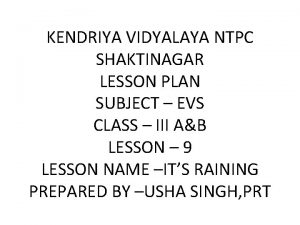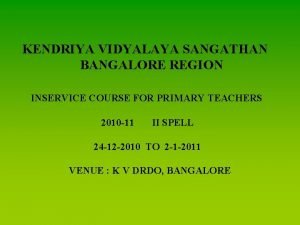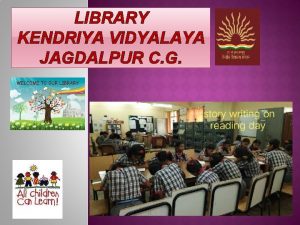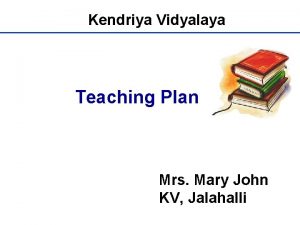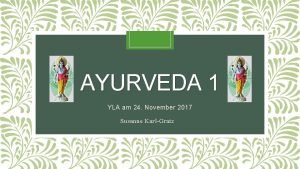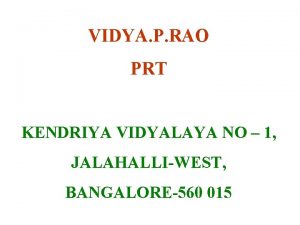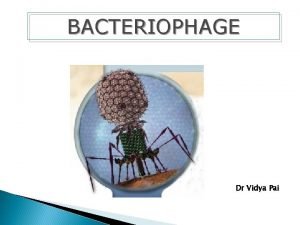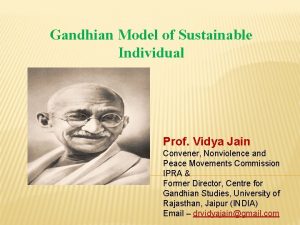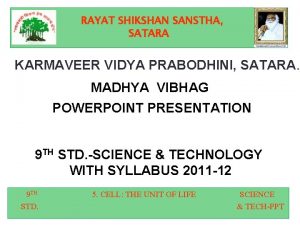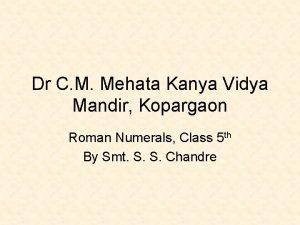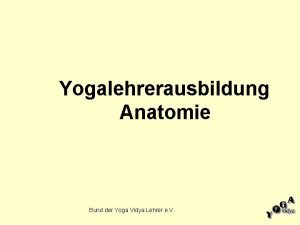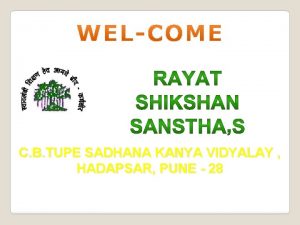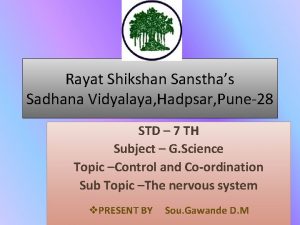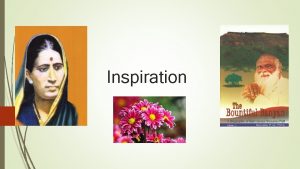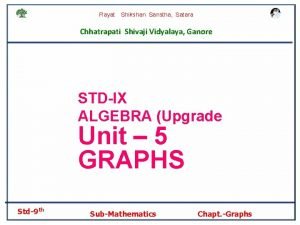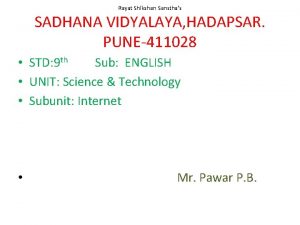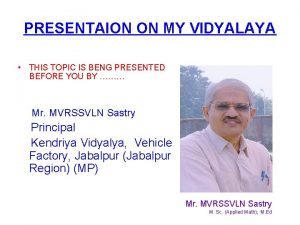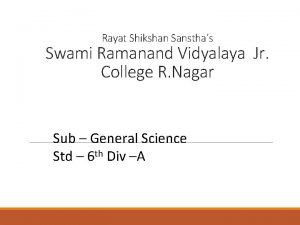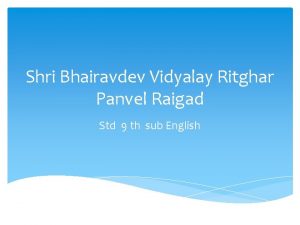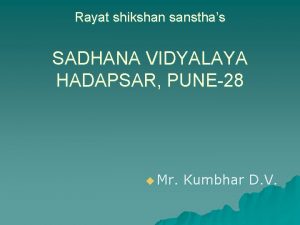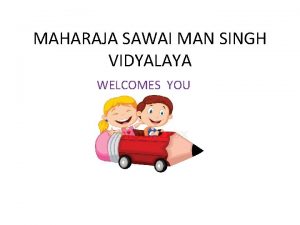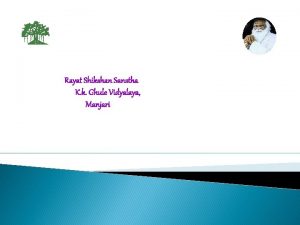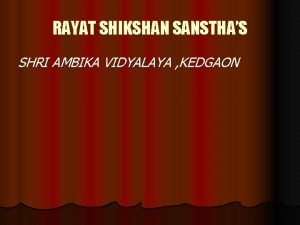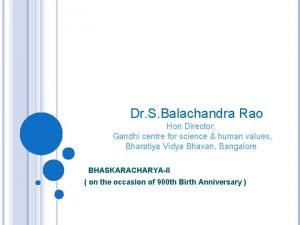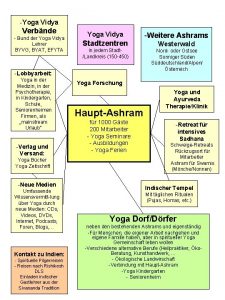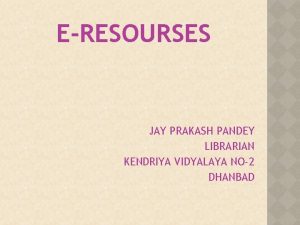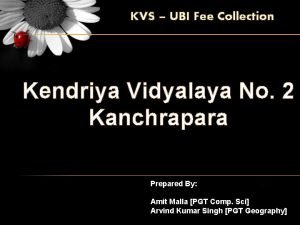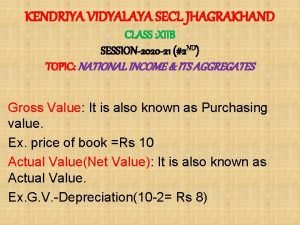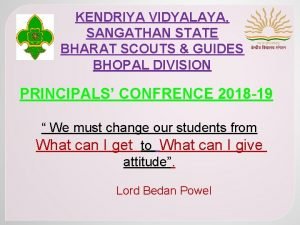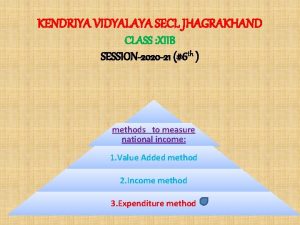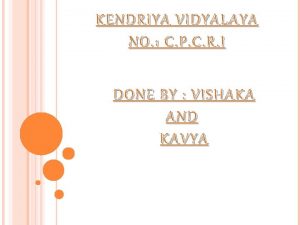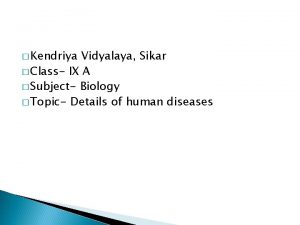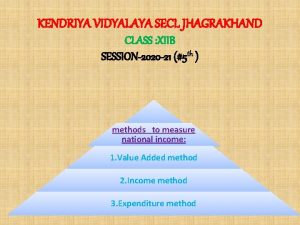VIDYA P RAO PRT KENDRIYA VIDYALAYA NO 1



































- Slides: 35

VIDYA. P. RAO PRT KENDRIYA VIDYALAYA NO – 1, JALAHALLI-WEST, BANGALORE-560 015


By Vidya. P. Rao

Tall trees Yellow flowers Red and juicy apples Our flag has three colors.

An adjective is a describing word. It qualifies a noun or a pronoun. The word ‘adjective’ comes from the Latin word meaning ‘added to’. An adjective, added to a noun, tells us more about the person or thing named by the noun. Ex: tall tree, yellow flowers, three colors juicy apples The words tall, yellow, three and juicy tell us about ‘trees, flowers, colors’ and ‘apples’. They are adjectives.

Demonstrative Quantity Quality KINDS OF ADJECTIVES Interrogative possessive Distributive

ADJECTIVE OF QUALITY This is a colorful and a poisonous frog. These ladies are traditional, Japanese dancers.

This beautiful rose is from my garden. They were the most famous Prime Ministers of India.

ADJECTIVE OF QUALITY An adjective that tells of what kind a person or thing is, is called an ADJECTIVE OF QUALITY. The words like colourful , poisonous , traditional Japanese, beautiful, the most famous add to the meanings of animals, persons or things.

ADJECTIVES OF QUANTITY Here are three books. There are five birds in this picture.

There is enough food for all of you. Is there any tea in the cup? There is only a little milk in the cup. But there is no tea.

The bold letters in the sentences three, five , enough, a little, no tell about the quantity of different nouns. They reply to the question how many or how much. Such words are called the Adjectives of Quantity.

DEMONSTRATIVE ADJECTIVE Look at this dog. Look at that butterfly. These crayons are of good quality. Those grapes are sour.

An adjective that points to a person, place or thing is called a DEMONSTRATIVE ADJECTIVE. REMEMBER: Use “this” for a Singular Noun that is near. Use “that” for a Singular Noun that is far. Use “these, those” for Plural Nouns.

INTERROGATIVE ADJECTIVES Whose picture is this ?

What is the color of this flower ? Whose dog is this ?

Which way shall we go ?

What a beautiful sight this is!

INTERROGATIVE ADJECTIVES The words what, which, how many, how much, whose are used to ask questions. They are INTERROGATIVE ADJECTIVES. They are also used to express exclamation.

DISTRIBUTIVE ADJECTIVES Every, each, either, neither, are Distributive Adjectives. They indicate one thing or person, taken separately out of a whole group or class. Every man must do his duty. Take this medicine every four hours. You should take neither sides.

POSSESSIVE ADJECTIVES This is my mother’s table.

This is our house.

It is his ball. These are from my garden.

My mother is a software engineer. This is her computer. These children are playing with their father. Their pet dog is also playing with them. Its colour is brown.

POSSESSIVE ADJECTIVES The words my, his, her, their, its, our, when used before a noun, are called Possessive Adjectives. They show ownership. My book, your sister. Her bags, their bicycles.

POSITION OF ADJECTIVES 1. Adjectives usually come before the nouns. Ex: a rich man, a beautiful sight, a clever boy. 2. An adjective phrase generally follows the noun. Ex: a man of wealth, a visitor from America, the lady crossing the road.

3. When an adjective is used predicatively, it is placed after its noun : All men are mortal. He became very rich. He was considered wise.

ADJECTIVES USED AS NOUNS When an Adjective is preceded by the Definite Article (the), it can be used as a noun: The poor = poor men The educated = those men who are educated

DEGREES OF COMPARISON There are three degrees of comparison. (a) Positive Tall (b) Comparitive (c ) Superlative Taller Tallest

Big Bigger Biggest

Mr. Bell’s Family Mr. Bell is a young man. Mrs. Bell is younger than Mr. Bell. Their daughter is the youngest of all. Younger Youngest

DEGREES OF COMPARISON There are three degrees of comparison: (a) Positive : This is the simplest form of the adjective. Happy, sad. He is happy. You are sad. (b) Comparative : This is used when two persons or things are being compared. Happier, sadder. He is happier than his brother.

(c) Superlative : This is used when more than two persons or things are being compared. Happiest, saddest, best. He is the best student of the class. Positive Comparative Superlative Poorer Poorest Thinner Thinnest Easy Easier Easiest Popular More popular Most popular Little Less Least

Underline each Adjective in the following sentences : 1. The_____ small girl went into the ___ big hall. ____ years. 2. The_____ brave soldiers fought for many ____ and juicy ____ 3. The____ ripe oranges were round ____ and ____ 4. My mother was weak thin. _____ stars. 5. The ____ dark sky was filled with bright

Complete the sentences by filling in the blanks with the correct Interrogative or Possessive Adjectives: 1. Which _____ of these books is yours ? her report card. 2. She has lost ____ his house. Where does he stay? 3. I could not find ____ 4. Whose _____ son are you ? 5. Which ______ way should I go to reach your school ?
 Kvs lesson plan for class 3 evs
Kvs lesson plan for class 3 evs Kendriya vidyalaya sangathan bangalore
Kendriya vidyalaya sangathan bangalore Kendriya vidyalaya jagdalpur
Kendriya vidyalaya jagdalpur Kendriya vidyalaya mahasamund
Kendriya vidyalaya mahasamund Kv bhu
Kv bhu Kendriya vidyalaya annual pedagogical plan
Kendriya vidyalaya annual pedagogical plan Sudhakar rao nirupama rao
Sudhakar rao nirupama rao Yogapoint.com
Yogapoint.com Shankham chakram jalauka
Shankham chakram jalauka Vidya no 1
Vidya no 1 Progagate
Progagate Rajiv vidya mission
Rajiv vidya mission Vidya amritam ashnute
Vidya amritam ashnute Vidya jain case
Vidya jain case Karmaveer vidya prabodhini
Karmaveer vidya prabodhini Ivxl roman numerals
Ivxl roman numerals Einatmung ausatmung
Einatmung ausatmung Sadhana kanya vidyalaya hadapsar
Sadhana kanya vidyalaya hadapsar Maharaja sawai man singh vidyalaya
Maharaja sawai man singh vidyalaya Rayat shikshan sanstha sadhana vidyalaya hadapsar
Rayat shikshan sanstha sadhana vidyalaya hadapsar Swami ramanand vidyalaya ramanandnagar
Swami ramanand vidyalaya ramanandnagar Chhatrapati shivaji vidyalaya
Chhatrapati shivaji vidyalaya Swachha vidyalaya puraskar.com
Swachha vidyalaya puraskar.com Kasturba gandhi balika vidyalaya varanasi
Kasturba gandhi balika vidyalaya varanasi Rayat shikshan sanstha sadhana vidyalaya hadapsar
Rayat shikshan sanstha sadhana vidyalaya hadapsar Sant tukaram vidyalaya dehu
Sant tukaram vidyalaya dehu My vidyalaya
My vidyalaya Swami ramanand vidyalaya ramanandnagar
Swami ramanand vidyalaya ramanandnagar Shri bhairavdev vidyalaya
Shri bhairavdev vidyalaya Sadhana vidyalaya hadapsar pune 28
Sadhana vidyalaya hadapsar pune 28 Maharaja sawai man singh vidyalaya
Maharaja sawai man singh vidyalaya Maharaja sayajirao vidyalaya satara
Maharaja sayajirao vidyalaya satara Swach vidyalaya abhiyan
Swach vidyalaya abhiyan Shri ambika vidyalaya kedgaon
Shri ambika vidyalaya kedgaon Agriculture
Agriculture S balachandra rao
S balachandra rao
